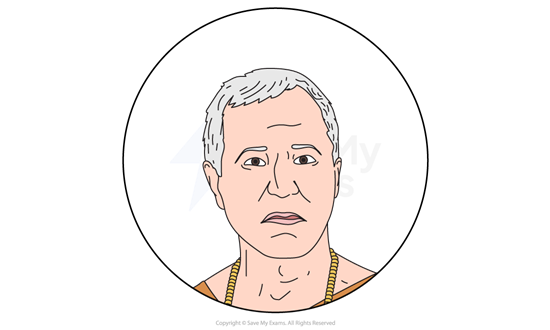Julius Caesar: Characters (AQA GCSE English Literature): Revision Note
Exam code: 8702
Your exam question on Julius Caesar will ask you to focus on either a theme or a character. Understanding Shakespeare’s choices when devising his characters, and how they deliver ideas (or convey themes), will help you write a convincing analysis and exploration.
Shakespeare’s characters symbolise various ideas about society and human nature, so it’s a good idea to consider how characters relate to each other, how they contrast each other, and how they reflect debates about betrayal, honour, manipulation, or leadership.
Below you will find character profiles of:
Brutus
Cassius
Caesar
Antony
Other characters:
Calpurnia
Portia
Soothsayer
Casca
Brutus

Brutus can be seen as the tragic hero, a politician devoted to the Roman republic:
His hamartia (opens in a new tab), or fatal flaw, is his naïvete and idealism, which allow him to be easily swayed by Cassius’ forecast that Caesar will become dictatorial
Shakespeare presents Brutus as a complex character: while he is intelligent and fair, he is easily influenced by traditional ideals:
His advice not to to kill Antony as well as Caesar stems from a desire to be honourable, yet this ultimately leads to his death
He loves his wife and describes her as “noble”, yet he refuses to confide in her or listen to her warnings, which leads to the fated assassination
Typical for a tragic hero, Brutus is later haunted by his actions: here, Caesar’s ghost
In the play’s denouement (opens in a new tab)Brutus’ hubristic (opens in a new tab)desire to be brave and honourable culminates in defeat by Antony’s army, as well as his suicide:
However, Antony’s final words honour him as a good Roman: “Nature might stand up/And say to all the world 'This was a man!'”
Examiner Tips and Tricks
Examiners suggest that the extract given in the question is best used as a springboard for your examination of the whole play. It is a good idea to explore, therefore, how the character in the extract behaves and speaks in relation to elsewhere in the play.
For example, if the extract comes from Act 1, then it will be worth exploring how Shakespeare introduces the character initially, before moving into a coherently argued analysis of how, and why, the character changes throughout the rest of the play.
Cassius

Cassius is crafted as a cynical and manipulative character, paranoid about tyranny:
In a soliloquy (opens in a new tab), he says that everyone is incapable of avoiding temptation
Shakespeare presents a Machiavellian nature, which makes him the play’s villain:
He sends out propaganda-like letters to exaggerate Caesar’s ambition
Caesar suggests his “lean and hungry” look is jealousy and ambition:
But Cassius often mentions freedom: he tells Brutus that he was “born a free man” just like Caesar, and asks his servant to be a “freeman” and stab him
A rhyming couplet (opens in a new tab) ending his soliloquy implies a fear of tyranny: “And after this let Caesar seat him sure;/For we will shake him, or worse days endure”
His character is a foil to his ally, Brutus: he is shrewd where Brutus is trusting:
He is proven correct in his warnings about Antony’s skilful speech
Cassius’ death is one of the most important in the play, implying his significance:
Wrongly believing his army has been defeated, he asks his servant to kill him, exclaiming “O, coward that I am, to live so long”, revealing traditional ideals
He declares Caesar’s revenge: he is killed by the same sword
One of his men, upon finding Cassius dead, states: “The sun of Rome is set!”
Caesar

While Shakespeare portrays Caesar as a calm, strong, and heroic character, he also presents his over-confidence as a flaw:
Caesar’s strength as a general is symbolised by a “lion”, which, ironically, he believes represents his prowess, but others foresee as his death
Caesar often refers to himself in the third person (opens in a new tab), which presents him as aloof and superior, as well as fatalistic: “Yet Caesar shall go forth”
Certainly, Caesar’s stoicism is presented as foolishness at times:
He ignores warnings from a soothsayer and his wife that predict his death
Calpurnia, his wife, tells him that his “wisdom is consumed in confidence”
His belief that death will “come when it will come” links to ideals of bravery: “Cowards die many times before their deaths;/The valiant never taste of death but once”
He is an admirable speaker, and refers to himself as constant as the “northern star”
Antony

Antony is an unpredictable character who represents ideas of loyalty and ambition:
Shakespeare first presents Antony as submissively loyal, which contrasts sharply with his later cunning
Caesar orders him to touch Calpurnia’s skirt, to which he replies, “I shall remember:/When Caesar says 'do this,' it is perform'd”
Later, Brutus refers to him as Caesar's “arm”, implying he is useless alone
This proves to be Brutus’ undoing, as Antony later controls Rome
The play often shows flawed politicians and generals underestimating others:
For example, Antony says of Cassius in Act 1, “Fear him not, Caesar; he's not dangerous;/He is a noble Roman and well given”
Later, Brutus believes Antony has made peace, only to be criticised in Antony’s powerful speech at Caesar’s funeral
Antony’s character represents the danger of powerful and deceptive language:
Sometimes he uses honesty to appear sincere, but only when it serves him, such as when he admits his “slippery” position to Cassius and Brutus
Anything he tells them, he says, makes him “Either a coward or a flatterer”
He admits freely that he loved Caesar, “O, 'tis true”
This is revealed as deceptive in his powerful funeral speech, during which he persuades the citizens to turn on the conspirators on behalf of Caesar
Nevertheless, in the denouement (opens in a new tab), Shakespeare presents him as an honourable leader, if a dangerously shrewd one: he calls Brutus the “noblest Roman of them all”
Examiner Tips and Tricks
One of the things examiners will be looking for in your response to an exam question on Julius Caesar is how Shakespeare presents character contrasts or, as the examiners state, look at “contrasts and parallels in characters and situations at different points in the text”.
You don’t always need to use quotations to support your ideas. For example, you could write: “While Brutus is presented as sophisticated, and employs rich metaphor (opens in a new tab) in his speech to the citizens, his powers of persuasion are inferior to Antony’s who delivers his persuasive monologue in blank verse (opens in a new tab).”
Other characters
Calpurnia

Shakespeare’s female characters are often portrayed as intuitive and sensible:
Calpurnia warns her husband Caesar about a dream in which she saw “horrid sights” and omens predicting death and destruction
While Caesar agrees to stay home, he changes his mind and leaves for the senate, where he is assassinated
Calpurnia’s words, that his confidence overpowers his wisdom, prove an accurate description of Caesar whose arrogance leads to a destined fate
Portia

Another intuitive female character in Julius Caesar is Brutus’ wife, Portia, daughter of Cato, a Roman statesman
Portia is worried about Brutus’ secretive behaviour: she asks if he is “sick”:
Her pleas for him to confide in her are ignored, despite Brutus describing her as “gentle”, “noble”, “true” and “honourable”
Although she protests that Brutus is treating her as if she lacks intelligence, her words still reveal gender norms of the time:
She credits herself by referring to her connections with men of status: “Think you I am no stronger than my sex, / Being so fathered and so husbanded?”
Soothsayer

The soothsayer appears in the exposition (opens in a new tab) to create suspense:
The warning “Beware the ides of March” is given to Caesar twice, and his attention is also drawn to it by Cassius and Brutus
Caesar calls the soothsayer a “dreamer” and ignores him
As with many of Shakespeare’s spiritual or ‘supernatural’ characters, their words are presented as wisdom and foresight, rather than magic:
In Act 2 Scene 4, when Portia asks if he knows Caesar is in danger, he replies: “None that I know will be, much that I fear may chance”
This implies a well-informed guess, rather than magical foreknowledge
In Act 3 Scene 1, Caesar is the one to repeat the warning back to the soothsayer, who once again warns him there is still time to avoid his fate, and is again ignored:
Thereafter the soothsayer does not appear in the play
Casca

Casca’s function in the play is to act as a messenger and, at times, a gossip-monger:
In the exposition, Cassius says, “pluck Casca by the sleeve;/And he will, after his sour fashion, tell you/What hath proceeded worthy note to-day”
Once Casca has related most of the news, he adds, “I could tell you more news”, and describes the tribunes taking scarves off Caesar’s statues
This introduces him as a pessimistic, opportunistic character who knows all the goings-on in Rome
Shakespeare uses Casca to represent the power of the spoken word: he builds a sense of foreboding as he spreads biased ‘news’:
He relates how Caesar was offered a crown but refused it twice, adding: “to my/thinking, he would fain have had it”, hinting at Caesar’s ambition
He tells the men about Caesar’s “falling sickness” in which he fell, “foaming” at the mouth, but turns sympathy against him by exaggerating his power
He describes the women in the city fawning over Caesar “if Caesar had/stabbed their mothers, they would have done no less”
He tells Cicero an owl hooted at midday, a sign of “portentous things”
Sources
https://shakespeare.mit.edu/julius_caesar/full.html (opens in a new tab).
“Julius Caesar Character Descriptions | Shakespeare Learning Zone.” Royal Shakespeare Company, https://www.rsc.org.uk/shakespeare-learning-zone/julius-caesar/character/whos-who (opens in a new tab). Accessed 1 August 2025.

Unlock more, it's free!
Was this revision note helpful?
